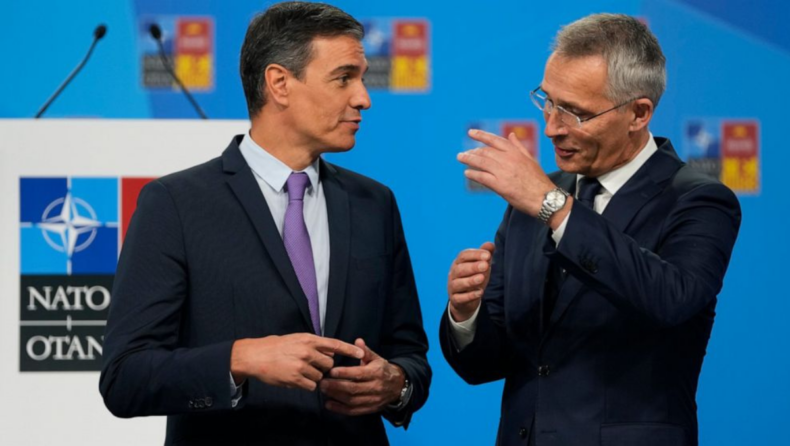War in Ukraine has triggered Europe’s worst security crisis in decades. Nato leaders meet for a summit, emphasising on boosting defence against the threat.
Russia’s invasion of Ukraine has caused a huge transformation in NATO’s approach to defence. The alliance’s leader said on Tuesday that member states will have to spend more on their militaries in an increasingly unstable world.
As US Vice President Joe Biden and other NATO leaders arrived in Madrid for a summit that will determine the direction of the alliance for the upcoming years, Secretary-General Jens Stoltenberg spoke. He said that in order to be able to defend in a more hazardous world, we have to invest more in our defence. The meeting is planned to sketch a strategy for the alliance in a more dangerous and uncertain world. Only nine of NATO’s thirty members reach the organisation’s goal of allocating 2 percent of GDP to defence. In discussions on Wednesday and Thursday, boosting defences against Russia and helping Ukraine will be high on the agenda for the leaders.
The invasion of Moscow on February 24 destroyed European security and brought back city shelling and bloody ground battles to the continent. NATO has once again had to deal with an adversarial Russia after beginning to shift its attention to terrorism and other non-state concerns.
”Ukraine now faces a brutality which we haven’t seen in Europe since the Second World War,” Stoltenberg said.
Entry of Sweden and Finland
As a result of Russia’s invasion, Sweden and Finland have decided to renounce their long-held nonalignment status and have asked to join NATO. However, Turkish President Recep Tayyip Erdogan is preventing them from entering, saying that he will only do so if these Nordic countries modify their position on Kurdish rebel groups that Turkey views as terrorist organisations. Stoltenberg expressed hope to make progress on the issue in Madrid.
In an effort to break the impasse, diplomats and leaders from the three nations have held a flurry of talks. On Tuesday, Stoltenberg and the leaders of the three nations are scheduled to meet in Madrid. Negotiations with Turkey have progressed, according to Swedish Foreign Minister Ann Linde, as she told Svenska Dagbladet newspaper. She also expected a positive outcome in Madrid but added that it could also take longer. The Turkish president did not budge from his position.
“We don’t want empty words. We want results,” Erdogan said on Tuesday, before leaving Ankara for Spain.
According to Jamie Shea, a former senior NATO official and associate at the Chatham House think tank, the Madrid meeting, which will include national leaders in the spotlight of the media, is the time of maximum pressure for compromise. He therefore expects results in Madrid, otherwise it’s likely to be stretched out for a long time.
NATO leaders would be free to concentrate on their main concern—a Russia that is becoming more unpredictable and aggressive—if the impasse over Sweden and Finland was resolved.
Rapid Reaction Force
An unsettling reminder of the atrocities of the war occurred on Monday when a Russian missile attacked a mall in the Ukrainian city of Kremenchuk in the country’s centre. Some perceived the timing—right before NATO and during the Group of Seven leaders’ meeting in Germany—as a message from Moscow. The strike on the mall was referred to as a “terrorist” incident by Ukrainian President Volodymyr Zelenskyy, who is scheduled to address NATO leaders by video on Wednesday.
At the summit, NATO allies will decide to roughly eight-fold the size of the alliance’s rapid reaction force from 40,000 to 300,000 soldiers, said Stoltenberg on Monday. The troops will have their home countries as their bases, but they will be stationed in particular states along NATO’s eastern border, where the alliance intends to stockpile supplies of equipment and ammunition.
Under the surface, differences exist within NATO over how the war will end and what, if any, concessions Ukraine should make to put a stop to the violence.
NATO’s strategy towards China
Differences exist on how strictly to approach China in NATO’s new Strategic Concept, the organisation’s once-a-decade set of priorities and goals. The most recent report, which was released in 2010, made no mention of China.
The new concept is expected to outline NATO’s strategy for dealing with China’s expanding economic and military influence as well as the growing significance and power of the Indo-Pacific region. The heads of Japan, Australia, South Korea, and New Zealand are attending the summit as guests for the first time.
Some European members are leery of the aggressive US stance toward Beijing and don’t want to associate China as an opponent alongside Russia. According to Stoltenberg last week, they don’t view China as an adversary but noted that China posed some challenges to their principles, interests, and security.













